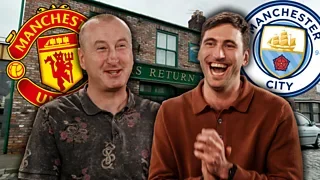
Robotic Derby Dilemma: Ageing City Midfield, Amorim’s Defence, And Manchester’s Identity Crisis
The latest Manchester derby at Old Trafford faded into a cautious stalemate, ending 0-0, yet sparking intense debate well beyond its forgettable scoreline. With pride, local supremacy, Champions League ambitions, and future plans at stake, this uninspiring match revealed deeper issues facing both Manchester giants and provoked candid reflection from prominent voices.
:no_upscale()/cdn.vox-cdn.com/uploads/chorus_asset/file/25944423/2208852720.jpg)
Instead of fireworks typically expected from a derby, both teams settled for caution. According to reports, United edged the better chances, especially through Zirkzee and Garnacho, while City looked blunt upfront, dependent almost solely on Omar Marmoush's threat. Joshua Zirkzee, Alejandro Garnacho, and Manuel Ugarte missed opportunities that could have tilted the contest, highlighting a wider malaise in finishing prowess.
For Pep Guardiola, this draw exposes a creeping flaw: an ageing, less dynamic midfield. Critics point out he fielded a diamond of De Bruyne, Gundogan, Silva, and Kovacic—average age nearing 32—with fresher legs like Nico Gonzalez and Jack Grealish benched. While these veterans boast immense technical skill and historic service, their collective lack of pace made transitions sluggish, allowing United to dominate key attacking phases but ultimately squandering their edge.
Pat Nevin summed it up evocatively: "There was something sad about watching Pep's men and comparing them with the fabulous dynamic sides of the past." The famed City energy and fluidity seemed replaced by laboured progressions. Nevin warned, "An entire midfield of that age and style just can't work if you want to be the best of the best in the Premier League." Both squads, he argued, appear in desperate need of a summer overhaul, with City’s situation surprisingly reminiscent of underachieving United’s rebuild.
Beyond midfield fatigue, City’s attacking output is another pressing worry. With Haaland sidelined and Phil Foden’s form dipping, Guardiola’s side lack reliable goals. Marmoush’s six goals since January have been a lifeline, but others like Jeremy Doku and Savinho—talented but still raw—struggle to impact big games, raising questions about their readiness. Oscar Bobb’s omission despite recovering further narrows options. With top-five finish imperative to secure Champions League football and lure stars like Wirtz or Camavinga, City’s fading cutting edge is a concern Guardiola must urgently address.

On the red side, manager Ruben Amorim accepted criticism—especially Gary Neville’s stinging remark of a "robotic" display from both teams—but insisted United are evolving to football’s tactical demands. Neville had lamented, “They’re micromanaged within an inch of their lives – so robotic, actually symptomatic of a lot of games now. It’s a Manchester derby and it should have more blood, thunder, risk, and courage.” Amorim conceded such views were "fair," yet defended the shift towards structured play. "The game is completely different. You must be so good in your base, then individual freedom and fluidity follows. But it takes time," he said.
Amorim contrasted today’s detailed, data-driven approach with Ferguson’s instinctive era, arguing meticulous tactics are now essential before moments of brilliance can shine. "Nowadays they know everything about our players. So we need a team idea and expect the individual part to help," he explained, acknowledging the current lack of creativity and understanding in the final third but emphasising the need to establish a tactical foundation.

This defensive, risk-averse approach may frustrate fans craving the visceral energy of derbies past, but Amorim believes it’s a painful yet necessary evolution. United’s priority is rebuilding identity amid turbulent transition while competing in the Europa League and chasing the Champions League return. Their 3-4-3 shape aims for collective solidity before individual stars can flourish again.
Meanwhile, City’s sluggish midfield and sparse attack question whether Guardiola can quickly refresh his formula or whether a sweeping summer reset is brewing. The reliance on veterans whose best days may be fading underlines their urgent need for injection of youth and dynamism—before waning Champions League prospects and transfer ambitions slip away.
This derby might have lacked drama on the pitch, but it revealed fundamental truths—and deep questions—both Manchester clubs must confront head-on. Is City’s dynasty in its twilight, or just readying for renewal? Is United’s robotically cautious evolution the right path or a symptom of lost identity? For all their differences, both must re-ignite a spark if Manchester’s two giants wish to reclaim their fiery glory days. What are your thoughts on the state of Manchester football? Join the debate and share your opinions below.